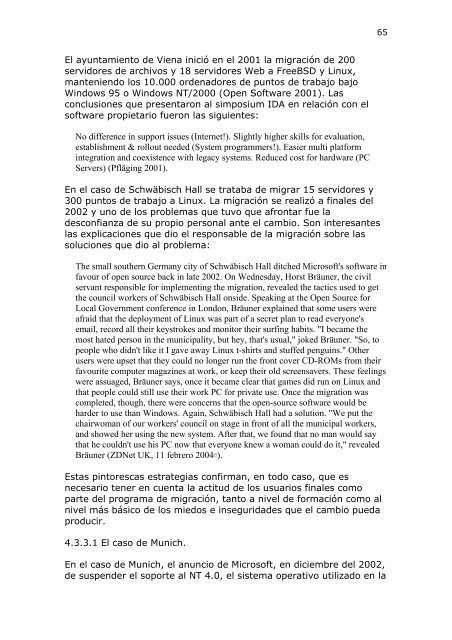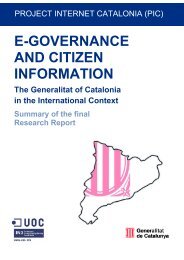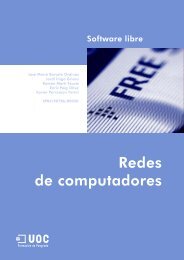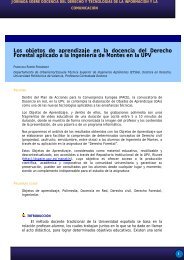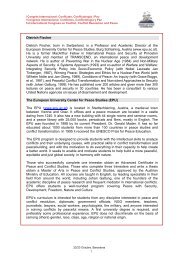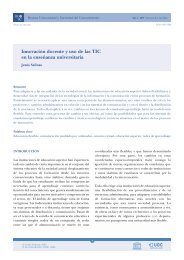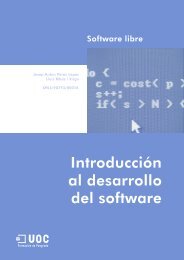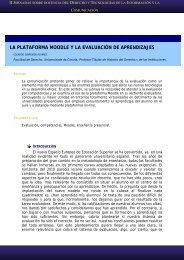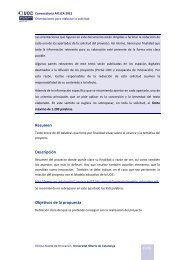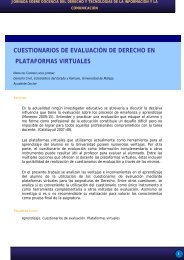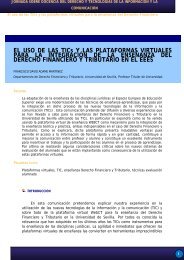El uso del software libre en las administraciones públicas de la UE
El uso del software libre en las administraciones públicas de la UE
El uso del software libre en las administraciones públicas de la UE
Create successful ePaper yourself
Turn your PDF publications into a flip-book with our unique Google optimized e-Paper software.
65<strong>El</strong> ayuntami<strong>en</strong>to <strong>de</strong> Vi<strong>en</strong>a inició <strong>en</strong> el 2001 <strong>la</strong> migración <strong>de</strong> 200servidores <strong>de</strong> archivos y 18 servidores Web a FreeBSD y Linux,mant<strong>en</strong>i<strong>en</strong>do los 10.000 ord<strong>en</strong>adores <strong>de</strong> puntos <strong>de</strong> trabajo bajoWindows 95 o Windows NT/2000 (Op<strong>en</strong> Software 2001). Lasconclusiones que pres<strong>en</strong>taron al simposium IDA <strong>en</strong> re<strong>la</strong>ción con el<strong>software</strong> propietario fueron <strong><strong>la</strong>s</strong> sigui<strong>en</strong>tes:No differ<strong>en</strong>ce in support issues (Internet!). Slightly higher skills for evaluation,establishm<strong>en</strong>t & rollout nee<strong>de</strong>d (System programmers!). Easier multi p<strong>la</strong>tformintegration and coexist<strong>en</strong>ce with legacy systems. Reduced cost for hardware (PCServers) (Pfläging 2001).En el caso <strong>de</strong> Schwäbisch Hall se trataba <strong>de</strong> migrar 15 servidores y300 puntos <strong>de</strong> trabajo a Linux. La migración se realizó a finales <strong><strong>de</strong>l</strong>2002 y uno <strong>de</strong> los problemas que tuvo que afrontar fue <strong>la</strong><strong>de</strong>sconfianza <strong>de</strong> su propio personal ante el cambio. Son interesantes<strong><strong>la</strong>s</strong> explicaciones que dio el responsable <strong>de</strong> <strong>la</strong> migración sobre <strong><strong>la</strong>s</strong>soluciones que dio al problema:The small southern Germany city of Schwäbisch Hall ditched Microsoft's <strong>software</strong> infavour of op<strong>en</strong> source back in <strong>la</strong>te 2002. On Wednesday, Horst Bräuner, the civilservant responsible for implem<strong>en</strong>ting the migration, revealed the tactics used to getthe council workers of Schwäbisch Hall onsi<strong>de</strong>. Speaking at the Op<strong>en</strong> Source forLocal Governm<strong>en</strong>t confer<strong>en</strong>ce in London, Bräuner exp<strong>la</strong>ined that some users wereafraid that the <strong>de</strong>ploym<strong>en</strong>t of Linux was part of a secret p<strong>la</strong>n to read everyone'semail, record all their keystrokes and monitor their surfing habits. "I became themost hated person in the municipality, but hey, that's usual," joked Bräuner. "So, topeople who didn't like it I gave away Linux t-shirts and stuffed p<strong>en</strong>guins." Otherusers were upset that they could no longer run the front cover CD-ROMs from theirfavourite computer magazines at work, or keep their old scre<strong>en</strong>savers. These feelingswere assuaged, Bräuner says, once it became clear that games did run on Linux andthat people could still use their work PC for private use. Once the migration wascompleted, though, there were concerns that the op<strong>en</strong>-source <strong>software</strong> would behar<strong>de</strong>r to use than Windows. Again, Schwäbisch Hall had a solution. "We put thechairwoman of our workers' council on stage in front of all the municipal workers,and showed her using the new system. After that, we found that no man would saythat he couldn't use his PC now that everyone knew a woman could do it," revealedBräuner (ZDNet UK, 11 febrero 2004 49 ).Estas pintorescas estrategias confirman, <strong>en</strong> todo caso, que esnecesario t<strong>en</strong>er <strong>en</strong> cu<strong>en</strong>ta <strong>la</strong> actitud <strong>de</strong> los usuarios finales comoparte <strong><strong>de</strong>l</strong> programa <strong>de</strong> migración, tanto a nivel <strong>de</strong> formación como alnivel más básico <strong>de</strong> los miedos e insegurida<strong>de</strong>s que el cambio puedaproducir.4.3.3.1 <strong>El</strong> caso <strong>de</strong> Munich.En el caso <strong>de</strong> Munich, el anuncio <strong>de</strong> Microsoft, <strong>en</strong> diciembre <strong><strong>de</strong>l</strong> 2002,<strong>de</strong> susp<strong>en</strong><strong>de</strong>r el soporte al NT 4.0, el sistema operativo utilizado <strong>en</strong> <strong>la</strong>


